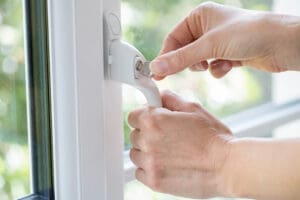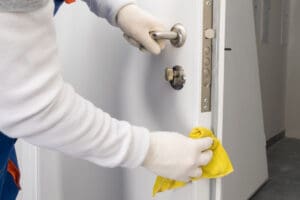PAS 24 Windows and Doors
What is PAS 24? In brief, it’s a UK benchmark for securing windows and doors against unauthorised access.
Our article demystifies PAS 24, its significance in building safety, and the pathway to certification, all while keeping technicalities to a minimum. Learn why this standard could be vital for your property’s protection.

Build your door today!
Get a Quote
Pas 24 Overview
- PAS 24 is a security standard for windows and doors set by the British Standards Institution, ensuring that products can resist unauthorised access and are regularly updated to reflect advances in security practices.
- PAS 24 certification process involves rigorous testing by UKAS-accredited laboratories to assess resistance to both manual attacks and simulated burglary attempts, resulting in a binary pass or fail outcome.
- To comply with UK building regulations, particularly Approved Document Q, new residential builds must use windows and doors that meet PAS 24 security requirements, also aligning with Secured by Design endorsement.
All our composite front doors are PAS 24 compliant.
Decoding PAS 24: The Security Benchmark for Windows and Doors

Publicly Available Specification 24, commonly referred to as PAS 24, is a security standard set by the British Standards Institution for windows and doors.
It serves as a benchmark and an assurance that a supplier is dedicated to prioritising security. The standard represents their commitment to supplying secure windows and doors capable of resisting unauthorised access.
PAS 24 standards are dynamic and regularly updated to reflect the latest developments in industry security practices. The most recent revision is PAS 24: 2022. This continual adaptation ensures that the security performance of windows and doors remains in sync with emerging technologies and burglary methods.
Whether for domestic dwellings or commercial buildings exposed to a comparable risk, PAS 24 certification ensures that windows and doors meet a minimum UK standard for security performance.
The Significance of PAS 24 Certification for Homeowners and Businesses
PAS 24 certified windows and PAS 24 doors are more than just structures; they are an essential first line of defence against break-ins.
For homeowners and property developers looking to upgrade their existing windows, it’s a valuable reassurance that their dwellings can resist unauthorised access, providing a level of safety that is vital in today’s world.
Composite doors are known for their high level of security and protection, so all the best composite doors easily meet the standards for PAS 24, as they should.
For businesses, PAS 24 certification offers several benefits:
- It extends beyond mere conformance with building regulations.
- It reflects their dedication to security and offers a clear marketing advantage.
- By choosing to implement PAS 24 certified products, businesses safeguard their assets and personnel against unauthorised entry.
- The regular updates to PAS 24 certification ensure that these security measures remain current and effective, reflecting advancements in security technology and criminal tactics.
PAS 24 2022
The new and updated version of the requirements is PAS 24 2022, which was a revision from PAS 24:2016. This updated version included a variety of new testing methods and clarifying old ones, and updating references regarding the industry standard.
PAS 24 will continued to be updated to make sure the standards are as high as they should be to ensure security and protection in homes and properties, especially from break-ins and damage. This means that PAS 24 front doors and windows will continue to get more and more sturdy and secure.
This doesn't just apply to front doors, as PAS 24:2022 also extents to other types of doors such as bifold and patio doors. The best bifold doors will all be extremely solid and reliable to prevent any damage to them.
Delving into the PAS 24 Testing Regime
Obtaining PAS 24 certification is a complex process involving an extensive series of tests conducted by laboratories accredited by UKAS. From evaluating the finished window or door as a whole to assessing resistance to manual attacks on hardware, cylinders and potential vulnerabilities, the process is rigorous.
Ultimately, the result is binary – either a pass or fail. The following subsections provide an in-depth examination of these test methods, including their operation and strength characteristics.
Manual Intervention Tests: Manipulation and Cutting
Manual intervention tests, key to the PAS 24 testing procedure, mimic various break-in methods to evaluate a product’s resistance. One such test is manipulation testing.
This involves attempts to disengage locks or hinges using common tools. It’s a test that seeks to measure how resistant a door or window is to common lock breaking methods, such as physical attacks.
Another critical manual intervention test is the manual test of cutting. Here, attempts are made with a drill or mechanised saw to create an opening and try to open the door or window.
These tests are conducted under strict laboratory conditions by UKAS accredited laboratories, which adhere to consistent and standardised testing procedures, ensuring the accuracy and reliability of the results.
Simulating Burglary Attempts: Impact and Mechanical Loading
Another key component of the PAS 24 testing regime is the simulation of burglary attempts, which involves a series of impact and mechanical loading tests, including the solid impact test.
- Impact testing involves the use of a mixture of soft and hard objects to simulate attempted break-ins.
- A sand-filled leather bag is used to replicate a door or window being struck by a uniform force.
- A metal battering ram on a pendulum assesses resistance to high-impact shock forces.
Mechanical loading tests, on the other hand, consist of applying forces up to 450kg to assess product durability. This could involve pulling hardware with hooks or employing a hydraulic press directly on the sash. As with all PAS 24 tests, UKAS meticulously evaluates testing laboratories to ensure their competence in carrying out these manual and mechanical assessments.
Understanding the Role of UKAS in PAS 24 Certification

The United Kingdom Accreditation Service (UKAS) holds a central role in the PAS 24 certification process by certifying independent testing companies to conduct PAS 24 tests, thereby ensuring their competence and impartiality. By doing so, UKAS ensures the integrity and accuracy of the PAS 24 certification.
UKAS is responsible for ensuring that testing companies comply with the established procedures and that the testing equipment used in PAS 24 certification is accurately calibrated. Manufacturers seeking PAS 24 certification must have their windows and door sets independently tested by organisations accredited by UKAS. This ensures unbiased and reliable testing.
Furthermore, UKAS maintains the integrity of PAS 24 certification by conducting regular visits to manufacturers to re-test products and verifying ongoing compliance with the standard.
Navigating Building Regulations: Approved Document Q and PAS 24
Approved Document Q holds a significant role in UK building regulations. In effect since October 2015, it mandates reasonable steps to resist unauthorised access. But it’s not just about the main access points.
The legislation also affects any potential entrance, such as ground floor and basement windows or doors in internally accessible garages, ensuring extensive protection against unauthorised access.
To comply with these building regulations, all new residential builds must demonstrate that their windows and doors have passed the security requirements of PAS 24.
At the same time, building regulations also require you to have ventilation near your doors and windows, with the most likely solution being trickle vents. The very rare issue is that trickle vents could possibly weaken the security of a window or door, as well as the PAS 24 certification, although this is almost never the case.
This makes PAS 24 the minimum legal standard that measures the ability of windows and doors in the UK to withstand physical attacks. Although this is only legally necessary for new residential builds or conversions, it is recommended to adhere to Approved Document Q security standards for all external door replacements for maximum security.
The Interplay Between PAS 24 and Secured by Design
PAS 24 and Secured by Design (SBD), while independent, hold close links in the security standards domain. PAS 24 is considered a minimum standard for products to meet other SBD requirements. This means that a product that has achieved PAS 24 certification has cleared a critical hurdle towards meeting SBD requirements.
Secured by Design endorsement, however, involves additional testing and ongoing inspections. This reflects the broader security risk management and advanced security measures that SBD focuses on.
SBD’s concept of defending in depth and minimising attack surface complements PAS 24’s rigorous testing for door and window vulnerabilities.
Choosing a supplier with products certified by both PAS 24 and Secured by Design ensures adherence to a high level of security standards and provides added reassurance for security-conscious projects.
Ensuring Quality: How Suppliers Meet PAS 24 Requirements

This is achieved through rigorous testing, ongoing compliance checks, and adherence to the latest specifications. PAS 24 certification is granted to products after they have been rigorously tested and assessed for high-level security performance.
If a component of a PAS 24-certified product is modified, a re-test is required to ensure it continues to meet the necessary security standards.
The manufacturing process is overseen by a UKAS-accredited Certification Body, confirming that doors meet PAS 24 requirements. Furthermore, suppliers ensure compliance with the current standards by implementing the latest PAS 24: 2022 specification.
If you want to further enhance the security of your windows, you can look to add security window film to them, adding another layer of protection to your glass panels.
To show evidence of PAS 24 compliance, manufacturers and suppliers can provide copies of the certification for their products.
Weather Resistance and Additional Performance Characteristics
PAS 24 certification, however, extends beyond security. It also encompasses weather resistance tests. These tests ensure that certified windows and doors can withstand adverse weather conditions and maintain structural integrity.
Windows are placed in a pressure chamber and sprayed with water to simulate wind pressure and evaluate water tightness. Doors are subjected to similar tests to ensure they can keep water out.
To pass the weather resistance test, doors and windows must comply with BSI standards for weather tightness and additional performance characteristics.
This ensures that your windows and doors can not only resist physical attack but also the forces of nature. After all, what good is a secure window or door if it can’t keep the rain out?
Selecting a PAS 24 Certified Window and Door Supplier
After grasping the importance of PAS 24 windows and doors, the next logical step is to choose a window and door supplier that offers PAS 24 certified products. After all, not all suppliers are created equal. To confirm PAS 24 certification, request the certification document directly from the manufacturer.
This will ensure that the products have passed the substantial testing required for PAS 24 certification and that the entire unit has been evaluated for security performance.
Choosing a supplier is not just about the certification, but also about their commitment to quality standards. Such a commitment not only supports adherence to building regulations but also delivers advanced property protection.
Therefore, when selecting a supplier, look for one that is committed to the highest quality standards and can provide PAS 24 certified products.
PAS 24 Front Door & Windows - Final Summary
In summary, PAS 24 certification is a critical security standard for windows and doors. It provides a benchmark for security performance, ensuring that products can resist attacks from casual or opportunistic burglars.
Achieving PAS 24 certification involves rigorous testing and ongoing compliance checks. The role of UKAS in maintaining the integrity and accuracy of the certification process cannot be overstated.
While PAS 24 certification is an essential security standard, it’s also part of a broader security initiative, Secured by Design, which encompasses additional security measures. When selecting a window and door supplier, remember to look for one that offers PAS 24 certified products for maximum security.
Frequently Asked Questions
What is the PAS 24 criteria?
The PAS 24 criteria is a standard for testing the security performance of windows and doors in the UK, ensuring that they meet minimum legal requirements for security in domestic and commercial buildings.
Are PAS 24 doors and windows the same as SBD?
No, PAS 24 accreditation is typically a baseline requirement for achieving SBD standards, and while SBD products must meet PAS 24 standards as a minimum, SBD goes beyond the requirements of PAS 24. Therefore, they are not the same.
Is PAS 24 a legal requirement?
PAS 24 is now a legal requirement to meet building regulations for newly built houses and properties. This is to ensure that the security of your doors, windows and home in general is at a high enough standard to protect you and your property.
What makes a PAS 24 door?
To be considered a PAS 24 door, it has to have been independently tested for its security credentials and can resist attacks associated with casual or opportunistic burglars. This standard relates to the security of windows and doors.
Why is PAS 24 certification important for homeowners and businesses?
PAS 24 certification is important for homeowners and businesses because it serves as a strong defense against break-ins and demonstrates a commitment to security and compliance with building regulations.
What tests are involved in achieving PAS 24 certification?
Achieving PAS 24 certification involves a range of tests, such as manual intervention tests like manipulation and cutting, as well as simulating burglary attempts through impact and mechanical loading tests. These tests are designed to assess the security performance of the product.









